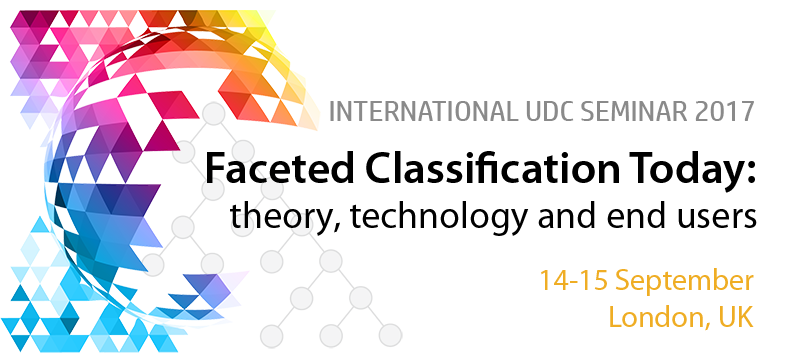
The International UDC Seminar 2017 "Faceted Classification Today: Theory, Technology and End Users" took place in London on 14-15 September 2017 at Wellcome Collection. This was the sixth in a series of International UDC Seminars devoted to advances in documentary classification research and their application in a networked environment.
The conference was attended by 61 delegates from 26 countries. The two-day programme included 17 talks and 5 poster presentations and was concluded by an engaging panel discussion.
This conference revisited faceted analytical theory as a method for (re)constructing modern analytico-synthetic classifications and explored potential fields of application for facet analysis in information organization.
The keynote speakers Prof. Richard Smiraglia and Prof. Vanda Broughton examined the role of facet analysis in knowledge organization and its place in classification theory. They provided a broad overview of facet analytical theory and its impact on the theoretical and application contexts of knowledge organization.
During the two-day programme, speakers covered issues ranging from historical overviews of facet analysis and its application in document collections, presenting faceted vocabularies using the tools of formal logic and entity relationship modelling - to discussing the issues of compositionality and its importance in modelling concepts and subject descriptions. Facet analysis as an approach in managing large data sets was put forward as something that the KO community should pay more attention to in the future. Some aspects of automation of synthetic classification codes (UDC) were also discussed. Finally, speakers looked into whether facet analysis is "discovered" or "invented", whether it is a rationalistic or pragmatic approach to knowledge organization and whether this is just one of the possible solutions, and if so, what are the possible alternatives. The Panel at the end of the Seminar discussed several questions from the audience: what is facet (given the multiplicity of definitions and interpretations?); what should classification managing organizations such as UDC Consortium do to improve the implementation and use of faceted vocabularies?; combination or collocation - what is the relevance of pre-coordination and post-coordination in resource discovery?; the difference between classes and concepts in classification schemes (in the context of data modelling), etc.
Presentation slides, posters, abstracts and speakers' biographies can be accessed from the conference programme.
The conference proceedings, published by Ergon can be ordered here.
